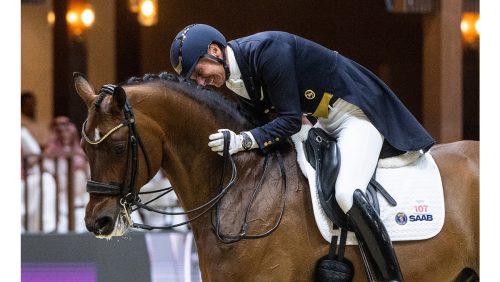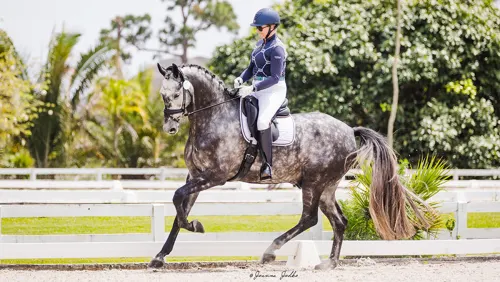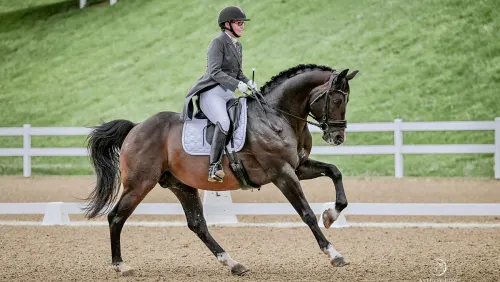Wellington, Fla.—Feb. 8
When Ellegria came out of the ring after her Grand Prix test in the CDI*** on Thursday, there was a small amount of blood on the inside of her left front fetlock. Under the previous Fédération Equestre Internationale rules, Ellegria would have been eliminated from that Grand Prix and today’s Grand Prix Special. But with the new FEI rule regarding blood, which went into effect Jan. 1, “Ella” was able to not only retain her third-placed finish in the Grand Prix but also come back and win today’s Special on a 68.73 percent.
“The horse had hit herself during the class. She must have interfered with her front legs,” said Shana Chase, DVM, who’s the FEI veterinarian at this CDI and checked the horse immediately after she left the ring when called by the FEI steward. “Because there was no sensitivity around the area, and she seemed quite comfortable, there was no reason she couldn’t continue to compete—assuming it [continued] to look good. This is the first time I’ve been able to apply the rule, and I appreciate having it when it’s something like what happened with Michael’s horse. When the horse just hits herself, and it’s nothing anyone did to be over-aggressive or anything like that, it’s a shame they’d be eliminated.”
The new FEI rule states: “If the judge at C suspects fresh blood anywhere on the horse during the test, he will stop the horse to check for blood. If the horse shows fresh blood, it will be eliminated. The elimination is final. If the judge through examination clarifies that the horse has no fresh blood, the horse may resume and finish its test.
“If the FEI Steward discovers fresh blood in the horse’s mouth or in the area of the spurs during the equipment check at the end of the test (Art. 430.10), he informs the judge at C, who will eliminate the horse and the/athlete. If there is blood elsewhere on the horse, an FEI veterinarian is to be called to decide if the horse is fit to continue.
ADVERTISEMENT
“If the horse is eliminated pursuant to the above, or if the horse is injured during the test and starts bleeding after finishing the test, it should be examined by an FEI veterinarian prior to the next competition to determine if it is fit to continue in the event the following day(s). The decision of the FEI veterinarian is not subject to appeal.”
Under the previous rule, blood anywhere on the horse meant automatic elimination. Before Ella went into the ring today, she was checked by officials again, and then she was checked after the test also.
Barisone, who’s riding Ella, a 13-year-old Westphalian (Ehrentanz I—Patrizia, Philipo) mare, for owner Lauren Sprieser, was also happy with the application of the new rule.
“She’s a chestnut mare with sensitive skin, and she had a little spot where she’d had scratches on that leg. We all love horses, and that’s why we do this,” said Barisone, who’s based in Loxahatchee, Fla., for the winter. “That mare tries her heart out for me. She likes to do the Grand Prix. Her ears are forward the whole time; her tail doesn’t move. We put all this time and effort into a horse, why hold them back from doing what they like to do? I think this rule was properly applied for the welfare of the animal. I think everyone handled it perfectly.”
Ella achieved today’s win even with an error of course on her score sheet; Barisone forgot a section of passage before one of the trot half-passes.
ADVERTISEMENT
“I don’t think I’ve gone off course in 20 years,” said Barisone. “The horse was wonderful to ride; she’s has next to no show ring experience at Grand Prix.
“I take no credit for the horse,” he added. “She belongs to Lauren, who’s been a student of mine for about five years now. Lauren’s done all the training on the mare, but I rode her for one winter season, just on and off trying to figure out how to finish her as a Grand Prix horse. Last year Lauren said, ‘I have to make a life decision, and my life decision is to sell this horse, so I can invest in young horses.’ She’s not only a great person, rider and trainer, but she’s also a smart businessperson. She said, ‘Why don’t you finish her, take her in CDIs and then sell her?’ ”
Barisone and Ella also finished second in last year’s Dressage At Devon (Pa.) CDI-W Grand Prix Special. And now that Barisone’s having such successful results with the mare, U.S. Dressage Chef d’Equipe Robert Dover is encouraging him to look into other options—including possible syndication—and Barisone plans to explore some of those options while keeping the horse on the market.
“My responsibility is with my client and student,” said Barisone. “One of the reasons I think it won’t be too long before she sells is because everyone can ride that horse. She’s cool and focused and doesn’t spook. All the rest of my Grand Prix horses have been really hot athletes and really high strung, and this horse is nothing like any others I’ve ridden. She’s stout with a thick neck, she looks like a stallion, and she’s not electric hot. I just love her. She’s a joy, and she could actually be ridden by an amateur. She’s an extremely fun horse to ride.”
Katherine Bateson-Chandler, who won the three-star Grand Prix on Thursday, finished second today (67.58%) with Wellnetta after also incurring an error of test and a break to canter during a trot half-pass.
Full results available online.














